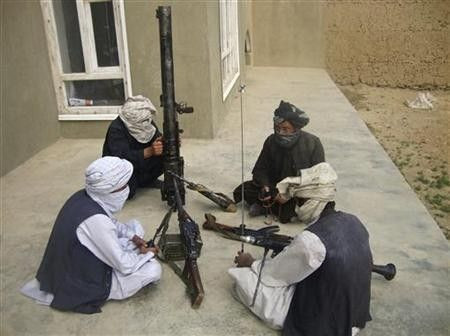U.S. Secret Peace Talks With Taliban Fall Apart Over Leaks

Secret exploratory peace talks between the United States and the Taliban have reportedly crumbled after details of the negotiations were leaked.
The early breakdown of the talks -- which began before the May 2 U.S. killing of Osama bin Laden -- are being blamed on "paranoid" Afghan government officials who, it is said, deliberately leaked the name of the Taliban's chief negotiator in the talks, Tayeb Agha, The Daily Telegraph reported.
Agha, Taliban leader Mullah Omar's former private secretary, and senior officials from the U.S. State Department and Central Intelligence Agency, agreed to absolute confidentiality in the meetings, which were held in Germany and Qatar earlier this year. The meetings were chaired by Michael Steiner, Germany's special representative for Afghanistan and Pakistan.
While only in the preliminary stage, the talks were a deliberate series of confidence-building measures to prove to the Taliban that the United States and its allies are not play-acting when it comes to forging peace and negotiating a settlement.
The Taliban, which openly harbored al-Qaida before Sept. 11, 2001, was initially apprehensive to join the talks, U.S. diplomats said, for fear the United States was only seeking to gain knowledge of their movements.
Furthermore, the Taliban believed that publicly aired news of the meetings would damage their credibility, especially following the bin Laden raid.
But only after three sessions, two in Germany and one in Qatar - held in March and April - details were leaked to the Washington Post and Der Spiegel news magazine, which named Tayeb Agha as the key Taliban negotiator.
Since the leak, diplomatic sources and others close to the talks have said Agha has not been seen and American officials have not been able to contact him through intermediaries in Quetta and Peshawar in Pakistan, where it is believed he lives.
"The talks were a big deal, the real thing. I hope people will learn the lesson on the importance of confidentiality in the early stages. People in the U.S. are horrified about what has happened," one source said.
According to sources in Kabul, the talks appeared to have been "blown out of the water" by the publicity.
For years, the Taliban has rejected Afghanistan President Hamid Karzai's attempts to gather around the negotiation table, but reports of contact with a senior aide to Mullah Omar had rekindled hope in Kabul.
Abdul Hakim Mujahid, the Taliban's former envoy to the United Nations, and now a member of Karzai's High Peace Council, told the Daily Telegraph in June that the contacts were "helpful."
"[Tayeb Agha] is still very close to Mullah Mohammad Omar; it's a good sign. Not only close to Mullah Omar, but close to Pakistan," he said.
The need for total confidentiality was understood by the United States, but American officials felt it was important to keep Karzai's government in the loop.
Michael Semple, a former deputy European Union representative in Kabu, and a leading expert on Taliban thinking, said the disclosure of the talks and the identification of the Agha were perceived as damaging by the insurgents.
"The Taliban have long claimed that they will drive the foreigners out by force before contemplating talks. They need a period of confidential contact to satisfy themselves that there is something serious on offer to warrant them taking the big step of acknowledging that negotiations have to start now and not after things have been settled on the battlefield," Semple said.
"When the fact that talks had taken place and the identity of the Taliban envoy were leaked, the Taliban shifted into their version of damage control. The leadership put it about that the contacts were nothing out of the ordinary. They were just routine discussions about prison releases, which a movement at war has to undertake periodically.
"It is hardly surprising that the Taliban chose to downplay the significance of Tayeb Agha's mission. In terms of progress towards negotiations which might end the war, it has proved a case of one step forward and two steps back," he added.
© Copyright IBTimes 2025. All rights reserved.





















